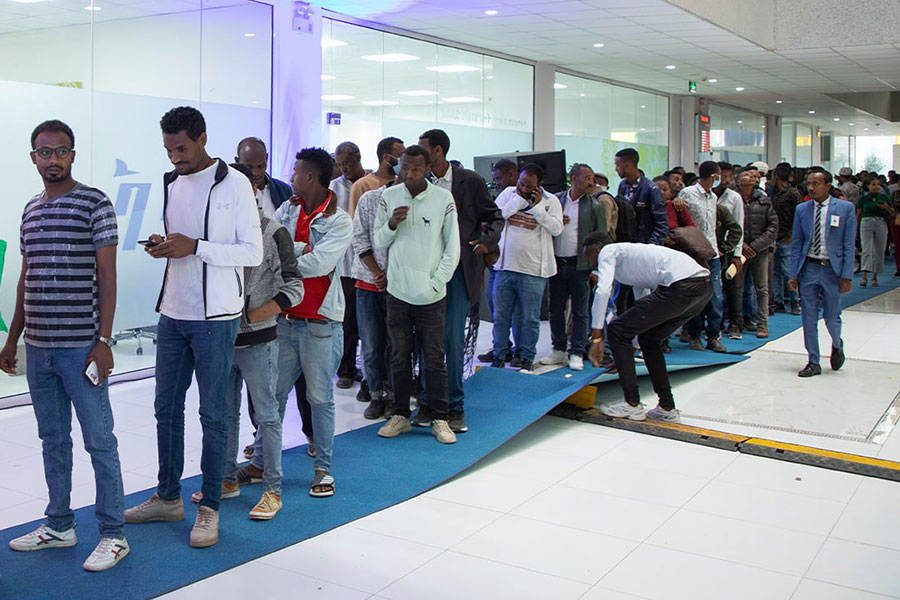
Radar | May 14,2022
Aug 3 , 2024
By Kidist Yidnekachew
I am a loyal customer of a shop near my home where I regularly buy lemons and potatoes. Their produce is better than others in the area, and they allow mobile banking or Telebirr payments, which keeps me coming back.
Sometimes, I send extra money so they can give me cash back for purchases at other stores. Although the amounts are small, it is more convenient than paying each shop separately. Recently, when I bought an item for 93 Br, I intended to pay 100 Br and get seven Birr in change. To my surprise, the shopkeeper told me they no longer provide change and asked for the exact amount.
This was frustrating, especially since the amount was small. Perhaps larger payments deplete their cash reserves, but for less than 100 Br, it seemed unreasonable. What is more absurd is that businesses are not keeping up with the growing trend of cashless payments. Later, I realised not everyone is comfortable with mobile banking. Some people are unfamiliar with it and worry about scams. Sometimes, transaction confirmations are delayed.
While I understand these concerns, businesses need to adapt to consumer needs and convenience. However, there is a disconnect. Adaptability is crucial for businesses in the digital age. Offering multiple payment options and accommodating customers demonstrates a commitment to customer service. It can also nurture loyalty and positive word-of-mouth.
Mobile banking can be convenient for consumers, but it can pose difficulties for small businesses that may not have the infrastructure or resources to handle digital transactions efficiently. This leads to delays, errors, or additional costs, explaining some businesses' reluctance to embrace cashless payments.
Making mobile payments often involves transaction fees charged by payment processors. These fees can add up, particularly for small businesses with tight profit margins. This financial burden may deter some businesses from offering cashless payment options. But the user is the one bearing the cost while paying for the service, which should not be a problem for businesses.
The success of M-Pesa in Kenya offers valuable insights into the potential of mobile money. By providing a platform for various financial transactions, the platform has empowered small businesses and individuals alike. For instance, a small grocery store can use M-Pesa for customer payments, supplier payments, staff salaries, and even as a platform for additional services like mobile credit top-ups and bill payments. This demonstrates the potential of mobile money to drive financial inclusion and economic growth.
The transition to cashless payments has also affected tipping habits, especially at restaurants. While digital transactions in platforms such as Telebirr may include an option to add a tip, some customers may feel less inclined to tip generously compared to cash transactions. However, digital tipping can provide more transparency in how tips are distributed among staff. In some establishments, tips added through mobile payments can be automatically pooled and distributed fairly, ensuring that all staff members receive a fair share.
Digital payment systems can include feedback mechanisms where customers can leave comments about their service. This provides valuable insights for businesses to improve their service quality and address any issues promptly. Ensuring a seamless and positive digital payment experience, including tipping, can enhance the overall customer experience.
There are business owners who go out of their way to give cash and serve as an informal bank. In my previous neighborhood, several shops were accommodating that I stopped visiting an actual bank branch to withdraw cash. I could simply go to these shops, and request money, and they would happily provide it, even for larger amounts like more than 1,000 Br.
Businesses must keep up with customer needs, offer flexible payment options, and invest in exceptional customer service to thrive in this new space. Adaptability, embracing technology, and prioritising customer experience are key to navigating the evolving space of digital transactions. Investing in robust internet connectivity and digital infrastructure is essential for seamless cashless transactions.
PUBLISHED ON
Aug 03,2024 [ VOL
25 , NO
1266]


Radar | May 14,2022

Radar | Oct 11,2020

Fortune News | May 11,2019

Fortune News | Apr 16,2022

Fortune News | Apr 02,2022

My Opinion | Sep 01,2024

Agenda | Jul 17,2022

Fortune News | Feb 26,2022

News Analysis | Nov 20,2021

Sunday with Eden | May 25,2019

Photo Gallery | 179386 Views | May 06,2019

Photo Gallery | 169583 Views | Apr 26,2019

Photo Gallery | 160498 Views | Oct 06,2021

My Opinion | 137175 Views | Aug 14,2021
Commentaries | Oct 25,2025

Dec 22 , 2024 . By TIZITA SHEWAFERAW
Charged with transforming colossal state-owned enterprises into modern and competitiv...

Aug 18 , 2024 . By AKSAH ITALO
Although predictable Yonas Zerihun's job in the ride-hailing service is not immune to...

Jul 28 , 2024 . By TIZITA SHEWAFERAW
Unhabitual, perhaps too many, Samuel Gebreyohannes, 38, used to occasionally enjoy a couple of beers at breakfast. However, he recently swit...

Jul 13 , 2024 . By AKSAH ITALO
Investors who rely on tractors, trucks, and field vehicles for commuting, transporting commodities, and f...

Oct 25 , 2025
The regulatory machinery is on overdrive. In only two years, no fewer than 35 new pro...

Oct 18 , 2025
The political establishment, notably the ruling party and its top brass, has become p...

Oct 11 , 2025
Ladislas Farago, a roving Associated Press (AP) correspondent, arrived in Ethiopia in...

Oct 4 , 2025
Eyob Tekalegn (PhD) had been in the Governor's chair for only weeks when, on Septembe...

Oct 25 , 2025 . By YITBAREK GETACHEW
Officials of the Addis Abeba's Education Bureau have embarked on an ambitious experim...

Oct 26 , 2025 . By YITBAREK GETACHEW
The federal government is making a landmark shift in its investment incentive regime...

Oct 29 , 2025 . By NAHOM AYELE
The National Bank of Ethiopia (NBE) is preparing to issue a directive that will funda...

Oct 26 , 2025 . By SURAFEL MULUGETA
A community of booksellers shadowing the Ethiopian National Theatre has been jolted b...